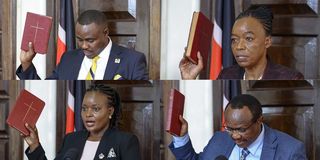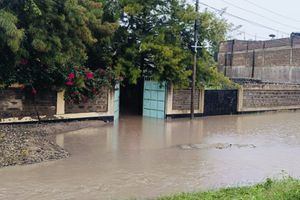Case seeking to bar Ndii, Malala from Cabinet meetings to be heard in September

Sworn to secrecy: President William Ruto cleared UDA secretary general Cleophas Malala (top left) and advisers David Ndii (bottom right), Monica Juma (top right) and Harriette Chiggai to attend Cabinet meetings.
The High Court has directed Attorney-General Justin Muturi to file his response in a case seeking to exclude four ‘strangers’ from Cabinet meetings within two weeks.
The case will be mentioned on September 20 for further directions.
Justice Lawrence Mugambi directed lawyer Charles Mugane, who has challenged the inclusion of UDA Secretary-General Cleophas Malala and the President’s advisers David Ndii (Economy), Monica Juma (National Security) and Harriette Chiggai (Women’s Rights) into the Cabinet, to serve Mr Muturi in preparation for the hearing of the case.
Other than Mr Muturi and the four advisors, Mr Mugane has named Secretary to the Cabinet Mercy Wanjau as a respondent.
Mr Magane challenged the inclusion of the four into the Cabinet, terming the decision illegal.
The Cabinet approved a decision to allow the four to attend Cabinet meetings on June 27 and they took an oath of secrecy at State House, Nairobi, on the same day.
The lawyer says the four are not members of the Cabinet and in fact, hold other portfolios.
Decision was challenged
“The Cabinet holds weekly meetings and there is real danger that the respondents will continue attending the said meetings if this court does not intervene,” he said.
Former President Uhuru Kenyatta had included Lieutenant-General Mohamed Badi in his Cabinet, but the decision was challenged by Ms Alice Wahome, now Water Cabinet minister.
In a decision rendered on September 23, 2021, High Court Judge Anthony Mrima issued a declaration that the decision to appoint and include Lt. General Badi into the business of the Cabinet was in contravention of Articles 3(2), 10(2), 129, 130(1) and 152(1) of the Constitution and is illegal.
In the latest case, Mr Mugane says the inclusion of the four in Cabinet meetings is unconstitutional because it was done in total disregard of substantive and procedural and constitutional requirements applicable.
“To the extent that the 2nd respondent (Ms Wanjau) has allowed ‘strangers’ into the Cabinet meetings, the said action offends the Constitution and is therefore, null and void,” Mr Magane said.
The lawyer says the fact that the inclusion of the four into the Cabinet without the involvement of Parliament, insulates the ‘strangers’ from oversight as provided in Article 95(5) of the constitution.
“An order of prohibition does issue against the 3rd, 4th, 5th, and 6th respondents prohibiting them from attending any Cabinet meetings,” says Mr Mugane.




